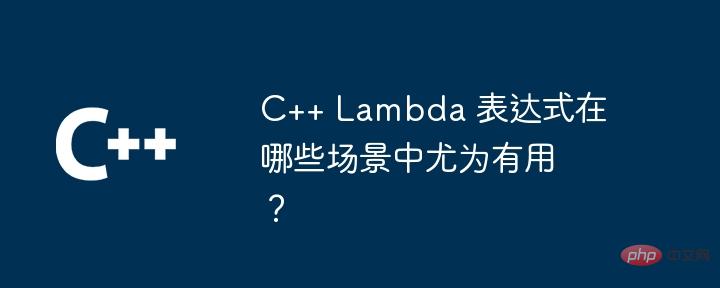

C++ Lambda Expressions: Powerful Tools for Specific Scenarios
Introduction
Lambda An expression is an anonymous function introduced in C++ that allows you to create short, inline function objects. They're great for handling simple tasks that don't require declarations or separate naming.
Lambda syntax
Lambda expressions adopt the following syntax:
[capture-list](parameters) -> return-type { body }Uses
Lambda expressions are particularly useful in the following scenarios:
std::sort and std::find. Practical case
1. As a callback function
The following code uses lambda expressions to convert strings For uppercase:
#include <iostream>
#include <string>
using namespace std;
int main() {
string str = "hello";
transform(str.begin(), str.end(), str.begin(), [](char c) { return toupper(c); });
cout << str << endl; // 输出:HELLO
return 0;
}2. As STL algorithm parameter
The following code uses lambda expression to find the first number greater than 5:
#include <iostream>
#include <vector>
using namespace std;
int main() {
vector<int> nums = {1, 3, 5, 7, 9};
auto it = find_if(nums.begin(), nums.end(), [](int n) { return n > 5; });
if (it != nums.end()) {
cout << "找到了第一个大于 5 的数字:" << *it << endl; // 输出:7
} else {
cout << "没有找到大于 5 的数字" << endl;
}
return 0;
}3. As a closure
The following code demonstrates how to create a closure using a lambda expression:
#include <iostream>
using namespace std;
int main() {
int x = 10;
auto f = [x](int y) { return x + y; };
cout << f(5) << endl; // 输出:15
return 0;
}Note: Compare to named functions , Lambda expressions have the following limitations:
When using lambda expressions, carefully weigh their advantages and limitations to determine whether they are the best choice for a specific scenario.
The above is the detailed content of In what scenarios are C++ lambda expressions particularly useful?. For more information, please follow other related articles on the PHP Chinese website!
 lambda expression
lambda expression
 What are the differences between c++ and c language
What are the differences between c++ and c language
 Recommended learning order for c++ and python
Recommended learning order for c++ and python
 Cost-effectiveness analysis of learning python and c++
Cost-effectiveness analysis of learning python and c++
 Is c language the same as c++?
Is c language the same as c++?
 Which is better to learn first, c language or c++?
Which is better to learn first, c language or c++?
 The difference and connection between c language and c++
The difference and connection between c language and c++
 C++ software Chinese change tutorial
C++ software Chinese change tutorial




